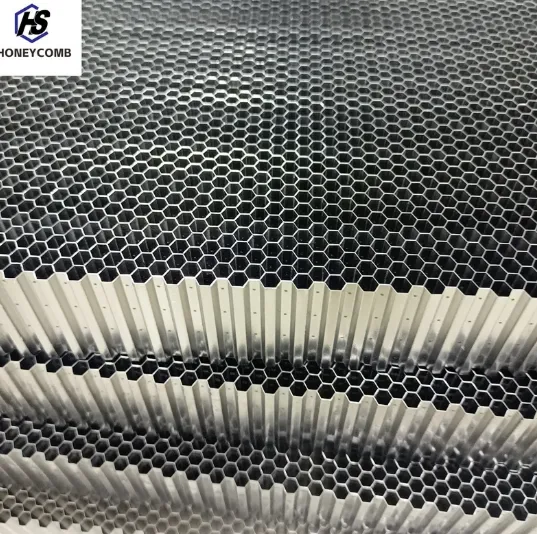
- Afrikaans
- Albanian
- Amharic
- Arabic
- Armenian
- Azerbaijani
- Basque
- Belarusian
- Bengali
- Bosnian
- Bulgarian
- Catalan
- Cebuano
- China
- China (Taiwan)
- Corsican
- Croatian
- Czech
- Danish
- Dutch
- English
- Esperanto
- Estonian
- Finnish
- French
- Frisian
- Galician
- Georgian
- German
- Greek
- Gujarati
- Haitian Creole
- hausa
- hawaiian
- Hebrew
- Hindi
- Miao
- Indonesian
- Italian
- Japanese
- Javanese
- Malay
- Persian
- Portuguese
- Punjabi
- Russian
- Spanish
- Swahili
- Telugu
- Vietnamese

Steel Honeycomb Core: The Backbone of Structural Excellence
Known for its outstanding load-bearing capacity and long-term durability, the čelično saćasto jezgro plays an increasingly critical role in industries demanding robust, lightweight, and fire-resistant structures. From aerospace cabins to marine partitions and architectural panels, it delivers unmatched structural stability in high-performance environments.

What Makes Steel Honeycomb Core Superior in Modern Engineering?
The čelično saćasto jezgro is composed of tightly bonded steel strips arranged in a hexagonal configuration. This geometry mimics natural honeycomb structures, which provide maximum strength with minimal material use. The resulting core is lightweight, rigid, and capable of bearing both compressive and shear loads exceptionally well. These properties make the čelično saćasto jezgro ideal for applications where high strength, dimensional stability, and fire resistance are critical.
Unlike traditional solid materials or foams, the čelično saćasto jezgro resists deformation under mechanical stress while maintaining its form. It is particularly useful in train floors, elevator panels, and cleanroom enclosures. Its fireproof characteristics, due to the non-combustible nature of steel, make it suitable for secure building partitions and explosion-proof structures.
Manufacturers can tailor cell size, thickness, and sheet material—often using galvanized or stainless čelični lim sa saćem—to suit a range of environmental conditions. The result is a highly adaptable material ready to meet diverse design requirements.
Steel Honeycomb Core vs. Aluminum Core: A Structural Comparison
While both steel and aluminum honeycomb cores share similar hexagonal architecture, they differ significantly in performance and ideal applications. The čelično saćasto jezgro excels in load-bearing strength and temperature tolerance. It remains structurally stable even when exposed to high heat, pressure, or impact—conditions where aluminum may warp or fatigue.
Aluminum honeycomb is lighter, which is advantageous in aerospace and automotive applications focused on fuel efficiency. However, the čelični lim sa saćem is preferable for high-security or industrial uses where strength and durability matter more than minimal weight.
Another major difference lies in corrosion resistance. Stainless čelični lim sa saćem resists rust and surface wear better than standard aluminum alloys, especially in marine or chemical environments. Furthermore, the čelično saćasto jezgro offers better sound insulation due to its higher density, which makes it favorable in construction panels and acoustic barriers.
In conclusion, while aluminum cores are excellent for mobility-focused designs, the čelično saćasto jezgro is the top choice when safety, longevity, and strength are non-negotiable.
Honeycomb Sandwich Panel Applications and Engineering Benefits
The most common way to deploy a čelično saćasto jezgro is within a sendvič panel u obliku saća, a composite structure made by bonding two rigid face sheets to the honeycomb interior. This configuration creates panels with an exceptional strength-to-weight ratio.
In a sendvič panel u obliku saća, the face sheets—often made of stainless steel, aluminum, or fiber-reinforced polymers—combine with the core to form a rigid, flat surface that doesn’t bend, sag, or warp under load. These panels are used in commercial flooring systems, ceilings, partition walls, and protective housings in military vehicles.
The internal čelično saćasto jezgro not only reduces overall panel weight but also enhances energy absorption, impact resistance, and insulation. This makes the panels especially useful in seismic zones or noise-sensitive environments such as recording studios, engine compartments, and cleanroom construction.
The key to optimizing a sendvič panel u obliku saća lies in the precise selection of core thickness, cell size, and bonding adhesives. Whether the panel is used for vertical load distribution in a skyscraper or vibration dampening in a ship’s cabin, customization is simple and effective due to the modular design of the čelični lim sa saćem.
Industry Standards and Quality Specifications of Steel Honeycomb Core
To meet industry demands, čelično saćasto jezgro materials must pass stringent mechanical and thermal tests. Products typically comply with international certifications such as ISO 9001 for manufacturing consistency and ASTM standards for performance metrics like shear strength and tensile resistance.
Important specifications include:
Cell Size: Ranges from 3 mm to 25 mm, depending on application.
Core Thickness: Varies between 5 mm and 100 mm or more.
Material Grade: Galvanized or stainless čelični lim sa saćem for corrosion resistance.
Bonding Methods: Epoxy adhesive, thermal fusion, or laser welding, ensuring long-term structural stability.
Quality control also includes thermal cycling tests, fire resistance evaluations, and bonding integrity checks. Some manufacturers offer specialty coatings—such as ceramic layers or fireproof epoxy finishes—for extreme applications like blast-proof shelters or hazardous chemical storage units.
Thanks to advancements in fabrication techniques, today's čelično saćasto jezgro options offer high flatness tolerance, customizable shapes, and millimeter-precise dimensions. This enables engineers to create consistent, lightweight panels that meet the demands of high-performance environments.
Steel Honeycomb Core FAQs
What are the key advantages of a čelično saćasto jezgro?
The čelično saćasto jezgro provides excellent strength-to-weight ratio, thermal stability, impact resistance, and fireproof properties. It’s suitable for both structural and protective applications.
How does a čelični lim sa saćem differ from aluminum?
A čelični lim sa saćem offers superior strength, fire resistance, and durability under harsh conditions. Aluminum is lighter but less suited for industrial environments with extreme stress.
Where are sendvič paneli u obliku saća used?
Honeycomb sandwich panels are used in cleanrooms, high-speed trains, ship decks, skyscrapers, and ballistic-proof structures. Their lightweight yet rigid structure makes them highly versatile.
What standards should a čelično saćasto jezgro meet?
It should comply with ISO 9001, ASTM E519, and, in some cases, AS9100 or EN standards, depending on the industry. These standards ensure consistent strength, safety, and durability.
Can a čelični lim sa saćem be customized for special applications?
Yes. Manufacturers offer tailored dimensions, materials (such as galvanized or stainless steel), and coatings for chemical resistance, flame retardancy, or acoustic insulation.
Kategorije proizvoda
-
Why Vented Aluminum Honeycomb Is Leading the Way in Shielding and Ventilation SolutionsVijestiJul.18,2025
-
Why Stainless Steel Honeycomb Panel is the Ultimate Choice for High-Tech Shielding and ProtectionVijestiJul.18,2025
-
Why Honeycomb Strips Are Revolutionizing High-Speed Sealing SolutionsVijestiJul.18,2025
-
Shielded Glass Innovation Powers the Future of Electromagnetic ProtectionVijestiJul.18,2025
-
Precision Starts Here: Revolutionizing Airflow Control with Honeycomb Wind Tunnel SolutionsVijestiJul.18,2025
-
Elevate Industrial Performance with Precision-Engineered Steel Honeycomb Core SolutionsVijestiJul.18,2025
-
Vented Aluminum Honeycomb: A Smart Shield for Airflow and EMI ControlVijestiJul.11,2025















